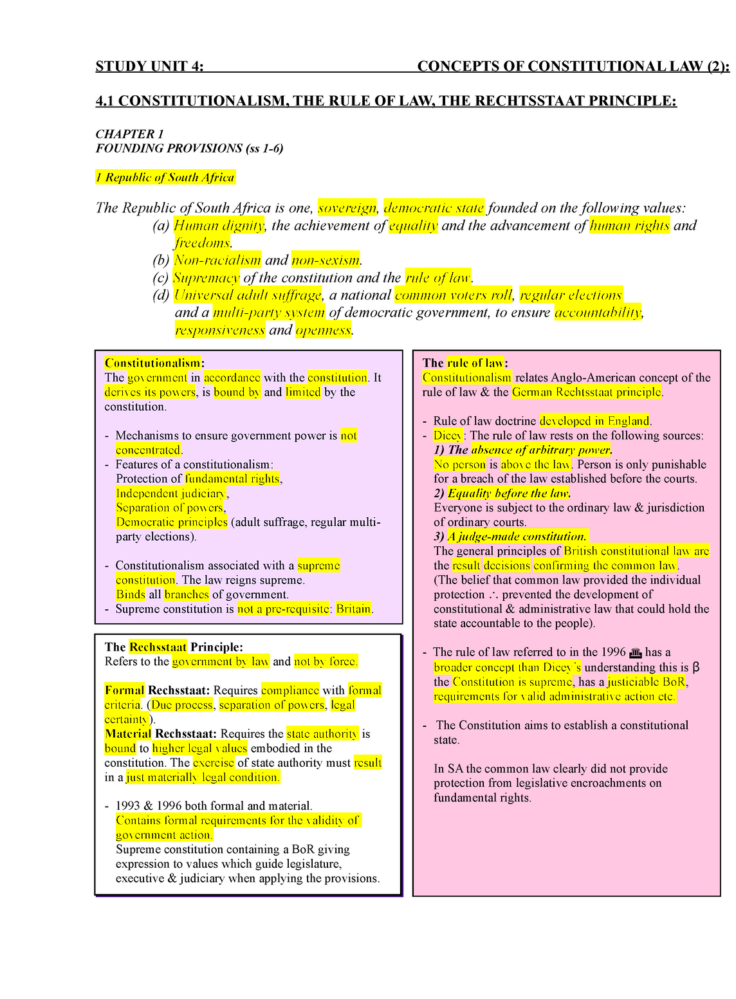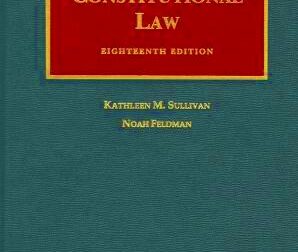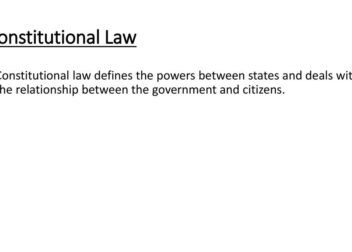Constitutional Law 9th Edition Key Concepts
Constitutional law is a vital area of legal study that focuses on the interpretation and application of the Constitution. It shapes the legal framework of a country, influencing how laws are created, interpreted, and enforced. Understanding constitutional law is essential for anyone interested in law, governance, or civil rights, as it provides the foundation for all other laws and legal principles.
Understanding the Constitution and Its Importance
The Constitution is the supreme law of the land, serving as the foundation for a country’s legal and political systems. Here are some key points about its importance:
- Framework for Government: The Constitution outlines how government branches operate, including the executive, legislative, and judicial branches.
- Protection of Rights: It safeguards individual rights and liberties, ensuring that citizens have protections against government overreach.
- Rule of Law: The Constitution establishes the principle that everyone, including government officials, is subject to the law.
- Basis for Legal Interpretation: It serves as the primary reference point for interpreting laws and resolving disputes.
By understanding the Constitution, citizens can better engage with their government and advocate for their rights, making it an essential part of democratic society.
Key Principles of Constitutional Law
Constitutional law encompasses several key principles that guide the legal system. Here are some of the most important:
- Separation of Powers: This principle divides government responsibilities among different branches to prevent any one branch from becoming too powerful.
- Checks and Balances: Each branch of government has the ability to limit the powers of the others, ensuring that power is balanced and abuse is minimized.
- Federalism: This refers to the division of power between the national and state governments, allowing for local governance while maintaining a national framework.
- Judicial Review: Courts have the authority to review laws and actions by the government to ensure they comply with the Constitution.
- Individual Rights: The Constitution guarantees certain fundamental rights, such as freedom of speech and the right to a fair trial, which protect citizens from governmental abuse.
These principles not only shape the legal landscape but also influence everyday life, ensuring a system of governance that respects and protects individual freedoms.
Fundamental Rights and Their Implications
Fundamental rights are essential guarantees provided by the Constitution that protect individuals from government abuse and discrimination. These rights are often enshrined in the Bill of Rights or similar constitutional documents. Understanding these rights is crucial, as they ensure that every citizen enjoys certain freedoms and protections.
Here are some key fundamental rights:
- Right to Equality: This right ensures that every individual is treated equally under the law, prohibiting discrimination based on race, religion, gender, or other characteristics.
- Right to Freedom of Speech: Citizens have the right to express their opinions without fear of censorship or retaliation, promoting open dialogue and debate.
- Right to Privacy: Individuals are entitled to keep their personal lives private, protecting them from unwarranted government intrusion.
- Right to Due Process: This guarantees fair treatment through the normal judicial system, ensuring that individuals have their day in court.
- Right to Religion: Citizens can practice their religion freely, allowing for diversity of belief in society.
The implications of these rights are profound. They not only shape the relationship between individuals and the state but also foster a culture of respect for human dignity and freedom. When these rights are upheld, society thrives, allowing citizens to live with dignity and security.
Structure of Government Under the Constitution
The Constitution establishes a structured framework for government, dividing powers and responsibilities to maintain order and protect citizens’ rights. Understanding this structure is key to comprehending how government functions.
The main components of this structure include:
- Executive Branch: Headed by the President or Prime Minister, this branch is responsible for enforcing laws and managing government operations.
- Legislative Branch: Comprising elected representatives, this branch creates laws and oversees government activities. It often includes two houses, such as a Senate and a House of Representatives.
- Judicial Branch: This branch interprets laws and ensures they align with the Constitution. It consists of courts, with the Supreme Court being the highest authority.
This separation of powers prevents any one branch from dominating the government, promoting a balanced system that encourages accountability and transparency. By understanding this structure, citizens can better engage in the democratic process and hold their government accountable.
Judicial Review and Its Role in Constitutional Law
Judicial review is a vital process in constitutional law, allowing courts to evaluate the constitutionality of legislative and executive actions. This principle ensures that the Constitution remains the supreme law of the land, protecting individual rights and maintaining the rule of law.
Key aspects of judicial review include:
- Authority of Courts: Courts have the power to interpret the Constitution and assess whether laws or government actions violate its provisions.
- Checks and Balances: Judicial review acts as a check on legislative and executive powers, preventing abuse and ensuring that all branches operate within constitutional limits.
- Impact on Society: Landmark judicial review cases can lead to significant changes in law and policy, affecting civil rights and social justice.
For example, cases like Brown v. Board of Education and Roe v. Wade illustrate how judicial review can reshape societal norms and protect individual rights. In this way, judicial review plays a crucial role in upholding the Constitution and ensuring a fair and just society.
Recent Developments in Constitutional Law
Constitutional law is constantly evolving, reflecting changes in society, politics, and technology. Recent developments highlight the dynamic nature of constitutional interpretation and the ongoing debates about rights and governance. Staying informed about these changes is essential for understanding the current legal landscape.
Here are some significant recent developments in constitutional law:
- Expansion of Digital Rights: Courts are increasingly addressing issues related to privacy and free speech in the digital age, shaping how the Constitution applies to technology.
- Voting Rights Legislation: Recent Supreme Court decisions have impacted voting rights, prompting discussions on gerrymandering, voter ID laws, and access to the ballot.
- Abortion Rights: Landmark cases, such as Dobbs v. Jackson Women’s Health Organization, have shifted the legal landscape regarding reproductive rights, raising questions about state powers and individual rights.
- Gun Rights and Regulations: The interpretation of the Second Amendment continues to be debated, with courts weighing the balance between individual rights and public safety.
These developments reflect broader societal changes and the ongoing struggle to interpret the Constitution in a way that meets the needs of all citizens. Understanding these trends is essential for anyone interested in constitutional law and civic engagement.
Challenges in Constitutional Law Today
While constitutional law provides a framework for governance and rights protection, it faces several significant challenges today. These challenges not only impact the legal system but also the lives of everyday citizens. Being aware of these issues helps in fostering informed discussions about law and policy.
Some of the key challenges include:
- Polarization of Legal Interpretation: Political divides often influence how constitutional principles are interpreted, leading to conflicting rulings and increased public distrust in the legal system.
- Access to Justice: Many individuals face barriers to accessing legal representation, particularly marginalized communities, which raises questions about the fairness of the legal system.
- Judicial Independence: There are growing concerns about the independence of the judiciary in the face of political pressures, affecting the impartiality of court decisions.
- Emerging Technologies: Rapid advancements in technology, such as artificial intelligence and data privacy, pose new legal questions that constitutional law must address.
These challenges highlight the need for ongoing dialogue and reform within the legal system. Addressing these issues is crucial for ensuring that constitutional law remains relevant and protective of individual rights.
Frequently Asked Questions
Understanding constitutional law can be complex, and many people have questions about its principles and applications. Here are some frequently asked questions that might help clarify some common concerns:
- What is the Constitution? The Constitution is the supreme law of the land, outlining the framework for government and protecting individual rights.
- What are fundamental rights? Fundamental rights are basic rights guaranteed to individuals, such as freedom of speech, the right to equality, and the right to due process.
- How does judicial review work? Judicial review allows courts to assess the constitutionality of laws and government actions, ensuring they align with the Constitution.
- What is the role of the Supreme Court? The Supreme Court is the highest court in the land, responsible for interpreting the Constitution and resolving significant legal disputes.
- How can I get involved in constitutional issues? Engaging in civic education, participating in local government, and advocating for rights through peaceful means are great ways to get involved.
These FAQs provide a basic understanding of constitutional law, helping individuals navigate its complexities and engage more meaningfully in discussions about rights and governance.
Conclusion
Constitutional law is a foundational aspect of any democratic society, providing the framework that governs the relationship between the state and its citizens. Understanding its principles, such as fundamental rights, the structure of government, and judicial review, is crucial for fostering informed citizen engagement. Recent developments and ongoing challenges highlight the need for vigilance and adaptation as society evolves. By staying informed about constitutional law and its implications, individuals can better advocate for their rights and participate actively in the democratic process, ensuring that the Constitution remains a living document that protects freedoms for all.


